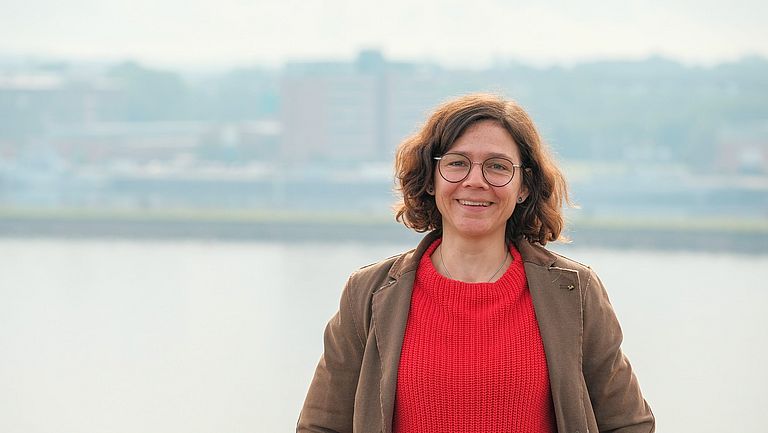When the ocean becomes a source of carbon dioxide
GEOMAR researcher Ivy Frenger receives ERC Starting Grant for her project OSTIA
The ocean has so far stored large amounts of carbon dioxide emitted by humans, and excess heat that accumulates in the Earth system as a result of these emissions. What will happen to the carbon dioxide and heat if we will not manage to rapidly mitigate emissions and thus will need to remove carbon dioxide from the atmosphere. Climate researcher Dr Ivy Frenger from the GEOMAR Helmholtz Centre for Ocean Research in Kiel, Germany, is trying to answer this question with the help of a complex Earth system model. For her project OSTIA (The Ocean'S role in miTIgating climAte change), she has been awarded one of the prestigious Starting Grants of the European Research Council (ERC), worth 1.5 million euros.
"We are very proud of Ivy Frenger's success and congratulate her on this award", says GEOMAR Director Professor Dr Katja Matthes. "The ERC Starting Grant is an excellent acknowledgement and a special honour for our young researchers. It gives them the opportunity to pursue their individual, highly relevant research questions. We are delighted to have talents like Ivy Frenger at our research centre and eagerly await the results of her research project. OSTIA will provide critical insights to better understand the impacts of climate change.
"This is basic research," says Frenger, "we need to understand the processes in order to assess the consequences of our interventions, such as a strong active removal of carbon dioxide from the atmosphere." Her research question addresses for the first time both carbon dioxide (CO2) and heat, tracking how they behave under such conditions, and which processes in the ocean are the most important, in particular the role of transport and mixing by eddies. "About 40 per cent of fossil fuel emissions and 90 per cent of heat have been absorbed by the ocean. Now we have a political goal to stop emissions or even, if we miss our climate target, to remove CO2 from the atmosphere in the second half of this century. What is the fate of the CO2 and heat that the ocean has absorbed?"
The ocean and the atmosphere are in a constant exchange, and the system is always trying to find a balance: When there is more gas in the atmosphere than in the water, CO2 is absorbed by the ocean, if the atmospheric CO2 content is reduced, and climate subsequently will cool, the ocean will release previously absorbed CO2 and heat. Frenger: "Our emissions are not gone, they are not forgotten, the ocean remembers the anthropogenic disturbance for millennia".
Dr Frenger is interested in when and where the release of CO2 and heat will occur, and what global and regional impacts this will have on the future climate. She is using her knowledge of ocean eddies, which could transport absorbed CO2 and heat from places of absorption to places of release. She will incorporate these phenomena into a complex Earth system model that will allow time travel to track the distribution of absorbed heat and carbon dioxide in the ocean and estimate the impact on our future climate.
"In the model, you can experiment," she says, emphasising one advantage of her approach: "I can see how the system responds, for example, if we overshoot the 1.5-degree warming target. The second big advantage: "You can measure the temperature and CO2 content of the water, but you can't tell what part of it is man-made. That part can be assessed in the Earth System Model because the pre-industrial values are known, and anything above that can be identified as a man-made disturbance."
To process the huge amounts of data that will allow her to track anthropogenic heat and CO2 in the ocean under different climate scenarios, she will use the supercomputer system operated by the North German Supercomputing Alliance (Norddeutscher Verbund für Hoch- und Höchstleistungsrechnen – HLRN) specifically for science and research.
About the ERC Starting Grants
The European Research Council (ERC), established by the European Union in 2007, is the premier European funding organisation for excellent frontier research. The Starting Grants are one of its four main funding programmes. This year, the grants - totalling 628 million euros - will support 400 young researchers to start their own projects. Announcing the winners, ERC President Professor Maria Leptin said: "It is part of our mission to give early-career talent the independence to pursue ambitious curiosity-driven research that can shape our future. In this latest round of Starting Grants, we saw one of the highest shares of female grantees to date, which I hope will continue to rise. Congratulations to all winners and good luck on your path to discovery."

Ivy Frenger, oceanographer at GEOMAR, receives one of the prestigious and well-funded ERC Starting Grants. Photo: Ilka Thomsen (GEOMAR)
![[Translate to English:] Server room with wardrobe-sized computers](/fileadmin/_processed_/0/1/csm_ziblise_boden_485d1b4f21.jpeg)
The Lise supercomputer in Berlin: Dr Ivy Frenger uses the computing power of the North German High Performance Computing Network (HLRN) to process the huge amounts of data she uses to track anthropogenic heat and CO2 in the ocean under different climate scenarios. Photo: Zuse-Institut Berlin (ZIB)
![[Translate to English:] A drawing shows two thick red arrows pointing from the sea into the air](/fileadmin/_processed_/b/0/csm_erc_illustrations_32trac_zoomv6_bd8f091dc0.png)
The ocean has so far stored large amounts of human-emitted carbon dioxide and excess heat. What will happen to it if the goal of removing more greenhouse gases from the atmosphere than are emitted is achieved? This is the question that Dr Ivy Frenger hopes to answer with her project OSTIA. Image: Ivy Frenger


